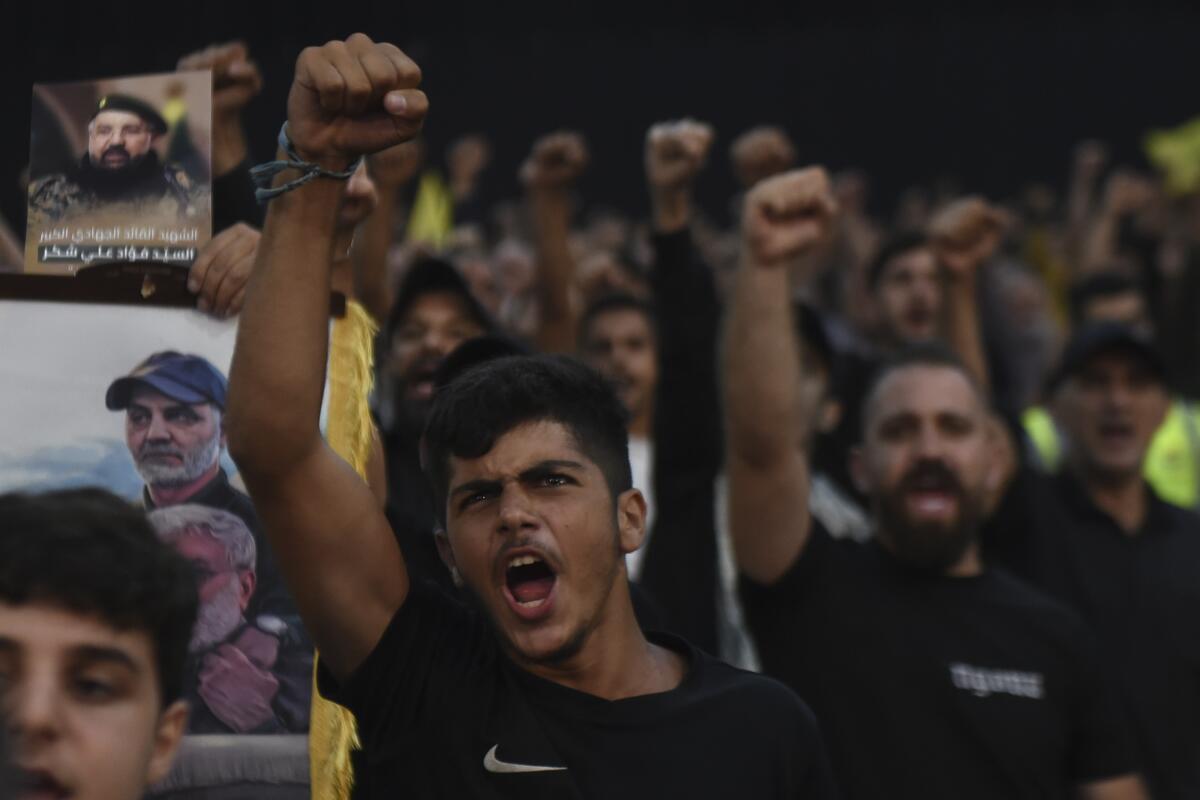Israeli civilians wounded by Israeli interceptor rocket after Hezbollah strikes

- Share via
At least 19 people, including six soldiers, were wounded in northern Israel on Tuesday after Lebanon’s Hezbollah militants launched drone attacks, emergency officials said.
Most of the casualties were caused by an Israeli interceptor rocket that missed and hit the ground, Israeli military officials said.
The violence comes as world leaders try to keep tensions in the Middle East from boiling over into a regional war.
Israel and Hezbollah have exchanged near-daily strikes for the last 10 months, after Hezbollah renewed hostilities with Israel in support of Palestinians fighting in the Israel-Hamas war in the Gaza Strip.
An Israeli airstrike earlier Tuesday killed four people in southern Lebanon, according to Lebanese authorities.
Hezbollah’s drones had targeted sites near the coastal town of Nahariya, the Israeli military said.
Separately Tuesday, in the occupied West Bank, Israeli fire during military raids killed 10 Palestinians, including four teenagers, and wounded another 10, Palestinian officials said.
The Palestinian Authority Health Ministry said that four people, including two 19-year-olds and a 14-year-old, were killed in an overnight raid in the village of Aqaba in the northern West Bank.
It said another four people, including an 18-year-old, were killed in an Israeli strike on a vehicle in Jenin — a frequent tinderbox— where the militant group Islamic Jihad said its fighters were battling the army.
Meanwhile two more Palestinians were shot dead by Israeli forces in the village of Kafr Qud, near Jenin, later Tuesday, the ministry said.
Efforts continue around the region to prevent the war from becoming a wider conflict after the killings last week of a senior Hezbollah commander in Lebanon and Hamas’ top political leader, who was visiting Iran.
Israeli Prime Minister Benjamin Netanyahu told his Cabinet over the weekend that the nation is already in a “multifront war” with Iran and its proxies.
The leader of Hezbollah vowed to retaliate against Israel for its recent airstrike in Beirut that killed Fuad Shukr, “no matter what the consequences are.”
Hassan Nasrallah said Hezbollah could either act unilaterally or in unity with its allies in the so-called axis of resistance that includes Iran and its proxies in Iraq, Yemen and Syria.
“The Israelis chose escalation by carrying out assassinations,” Nasrallah said.
Israel has acknowledged it killed Shukr but did not claim or deny the rocket attack that killed Hamas leader Ismail Haniyeh, who was visiting Tehran.
U.S. officials have been scrambling in recent days to restore calm to the region and head off any counterattacks against Israel by Iran or its proxies.
Meanwhile, in Gaza, the only corridor for humanitarian aid to enter the south has been shut down because of fighting in the area. The Palestinian territory faces a severe humanitarian crisis, and its Health Ministry says the death toll in the war is approaching 40,000.
Children in Khan Yunis have to line up for a long time to get food at charity kitchens and fill up about 2½ gallons of water in plastic containers — hardly enough for large families. Water has become severely scarce in Gaza after wells across the enclave were destroyed in Israeli airstrikes.
“Life here is unbearable,” Ghalia Hamouda, a woman displaced from Beit Lahiya, told the Associated Press. “There is no water. We don’t have charity kitchens. Our children have been sick all day … and stomach cramps never go away.”
A woman from a displaced family cooked white beans in thin tomato sauce over a basic stove as seven relatives gathered around to eat two plates of the beans with pieces of bread.
Last month, United Nations experts declared that famine has spread throughout the Gaza Strip as they reported cases of malnutrition and dehydration.
“We’re deprived of everything, including aid, which we don’t see. Where is the humanitarian aid?” said Rahaf Al-Refi, a woman displaced from Gaza City.
More to Read
Sign up for Essential California
The most important California stories and recommendations in your inbox every morning.
You may occasionally receive promotional content from the Los Angeles Times.










